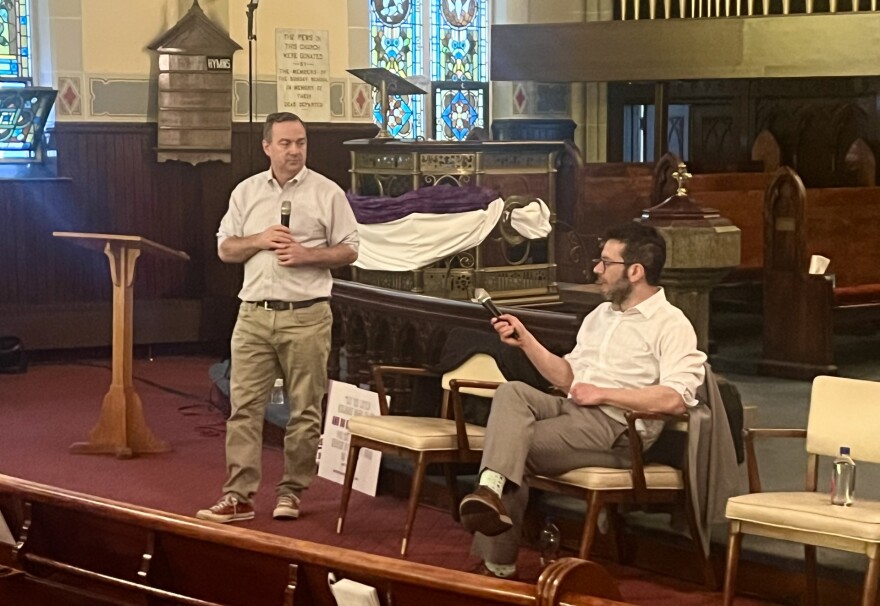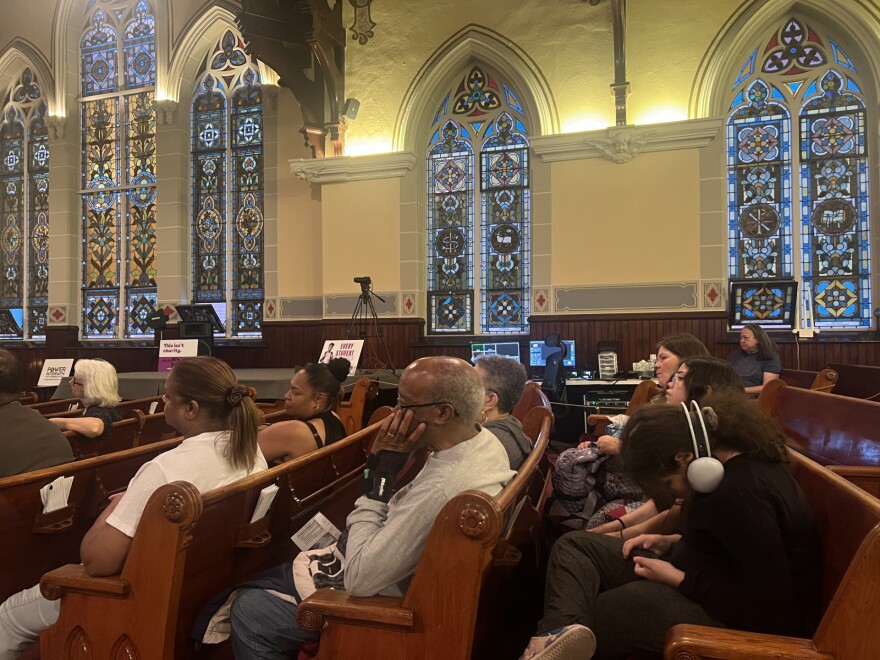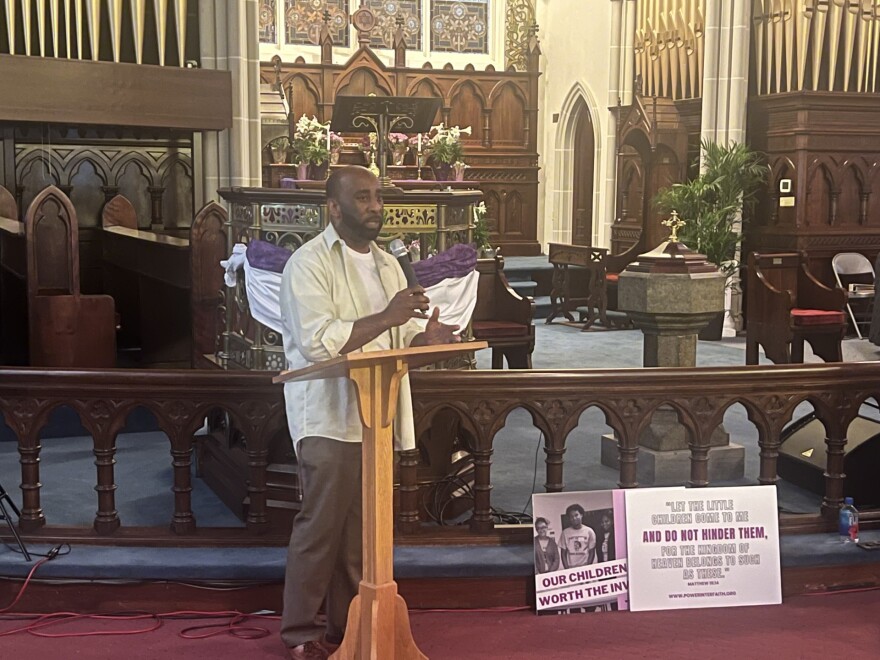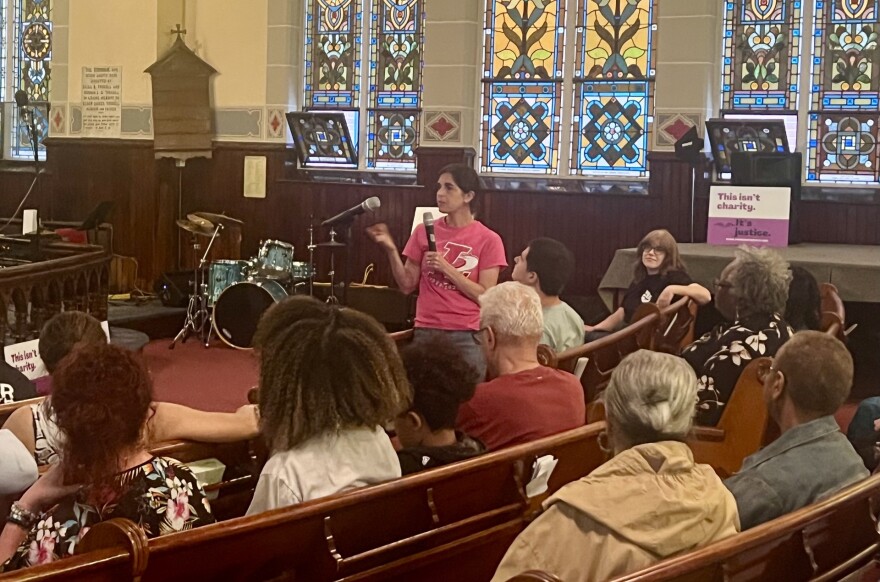ALLENTOWN, Pa. — Activists are pushing to fairly fund all Pennsylvania public schools over the next four years — a timeline local legislators say is, unfortunately, unrealistic.
“The truth is we can't,” state Rep. Mike Schlossberg, D-Lehigh, told a crowd of 60 people gathered for a Thursday town hall at Resurrected Life Church in Allentown.
“We just can’t. And it’s a painful answer.”
The town hall was held by POWER Interfaith, a Pennsylvania-based group of more than 50 faith communities that advocate for social justice issues.
The Lehigh Valley event was among seven town halls on public education funding being held by the group across Pennsylvania.
Fair public education funding has been distinctly top of mind for legislators, activists and school leaders in recent years because of a 2023 Commonwealth Court ruling that deemed Pennsylvania’s school funding system unconstitutional.
A Republican judge said the state’s funding system put poor students in neighborhoods with low incomes and low property values at a disadvantage educationally.
In response, a bipartisan commission of state legislators was assembled to develop a plan for fairly funding Pennsylvania public schools.
“The idea of doing it even faster frankly in the current political makeup of Pennsylvania is simply impossible."State Rep. Mike Schlossberg
The commission’s report determined Pennsylvania schools were underfunded by $5.4 billion and set a seven-year timeline to fill the adequacy gap.
The commission determined the state would cover $5.1 billion and the remainder of funds would come from local school property taxes.
The Democrat-controlled state House subsequently passed a bill to codify the commission’s seven-year funding plan. But the Republican-controlled state Senate never did.
During the 2024 budget cycle, the state settled with education advocates, landing on a $4.5 billion adequacy funding goal and a nine-year timeline — $6 million less and two years longer than the commission’s report suggested.
“The idea of doing it even faster frankly in the current political makeup of Pennsylvania is simply impossible,” Schlossberg told attendees at the town hall.

'That's the deal'
State Rep. Peter Schweyer, D-Lehigh, also attended the Thursday event and encouraged people to stay involved in the fair funding conversation.
“What we need is activism,” said Schweyer, also majority chairman of the Pennsylvania House Education Committee.
“We need people calling and protesting and marching and talking and writing letters and engaging their communities. We can’t do this alone.”
“I’m of the opinion, that’s the deal that we cut, we’re going to stick to it."State Rep. Peter Schweyer, House Education Committee majority chairman
Democratic Gov. Josh Shapiro’s 2025-26 education budget proposal would allocate an additional $526 million through the commission’s adequacy formula.
Schweyer said that funding amount is in keeping with the nine-year timeline agreed to last budget cycle.
The timeline, he said, is no longer up for debate — that applies to education advocates who want to expedite it and to any Republican legislators who want to nix the adequacy funding altogether.
“I’m of the opinion that’s the deal that we cut, we’re going to stick to it," Schweyer told LehighValleyNews.com.
In his budget proposal, the governor also proposed a $75 million increase in basic education funds and a $40 million increase in special education funds.
Charter reform has focus on cyber schools
Additionally, Shapiro proposed a statewide cyber charter school tuition rate of $8,000 to better align with the actual costs of educating children online.
That reform, which Shaprio pushed for unsuccessfully last budget cycle, would save school districts $378 million annually.
“We have a moral obligation that says that if we’re going to be investing a dollar in a kid, that kid better get the best we can provide for that dollar,” Schweyer said at the town hall.
“That is not happening in cyber schools.”

Districts can put regulations on brick-and-mortar charter schools, but not cyber schools, Schweyer said — they’re controlled by the state.
Schweyer and the House Education Committee are currently conducting a statewide tour on cyber charter oversight and accountability, he said.
A hearing was held in Johnstown, Cambria County, on Friday. The next hearing will be 10 a.m. May 8 at Stroudsburg High School in Monroe County.
Schweyer said a comprehensive cyber charter reform bill will be introduced in the state House soon.
Bethlehem Area school directors at Thursday’s town hall also shared their concerns about charter schools.
“A number of dollars that come into the Bethlehem Area School District leave our schools to go to charters," said school Director Karen Beck Pooley.
"And we’re not totally sure that those dollars are actually teaching children.
“Many of those dollars are going to advertisements to entice more children to go to those schools or [to] other extras that aren’t necessarily part of their education.”
School Director Winston Alozie said charter tuition payments draw funds away from public neighborhood schools, leaving less money for building maintenance, staff and educational resources.
Alozie also emphasized the importance of public schools for a “stronger, more knowledgeable society” and raised concerns about their politicization.
“We’re hearing rhetoric that is causing people to distrust public education, and that should concern everyone here because public education is the backbone of American society,” he said.

Trump administration's impact
Local legislators also acknowledged how President Donald Trump’s administration is impacting public schools.
“Every time you turn on the news or you turn on Twitter or you turn on social media, something new, that is terrible, is also happening,” Schlossberg said.
“Those are students we are mandated and morally obligated to serve."Karen Beck Pooley, Bethlehem Area school director
He criticized Trump’s decision this week to cut $1 billion in school mental health grants.
The Trump administration has also threatened to cut federal funding to public schools that don’t eliminate diversity, equity and inclusion programming.
Though federal judges haveruled that move would be an overstep, local school district leaders are still worried about their funding.
Bethlehem Area’s Beck Pooley said Thursday that the Title I funds Trump threatened over DEI go to “our most vulnerable,” including special education students and English language learners.
“Those are students we are mandated and morally obligated to serve,” she said.
Beck Pooley said the loss of federal funds would force Bethlehem Area to rely more heavily on local taxpayers.
'You ain't getting it'
Reps. Schlossberg and Schweyer said the state would not be able to make up for a loss of federal funding to schools.
“We simply can’t back fill federal resources,” Schlossberg said.
"We simply can’t back fill federal resources."State Rep. Mike Schlossberg
“Our economic situation is very questionable," he added.
“The United States economy, after years of growth, contracted [in] the first quarter of 2025, which means we don’t know how much revenue we’re going to have.
"[That] means we can’t accelerate the amount of dollars we give to public education.”
Schweyer agreed with Schlossberg, but said he’s not yet concerned about losing federal funding. He’s more worried about the federal government making it hard to access already allocated money.
For instance, federal government employees who helped administer Head Start — an early childhood education program — were recently put on leave, making it hard for preschool operators to use their funding at local centers throughout the country.
Those are the kinds of situations Schweyer said he fears most.
“If you’re firing all the tellers at the bank and you lock the doors, the money might still be there, but you ain't getting it,” he said.


